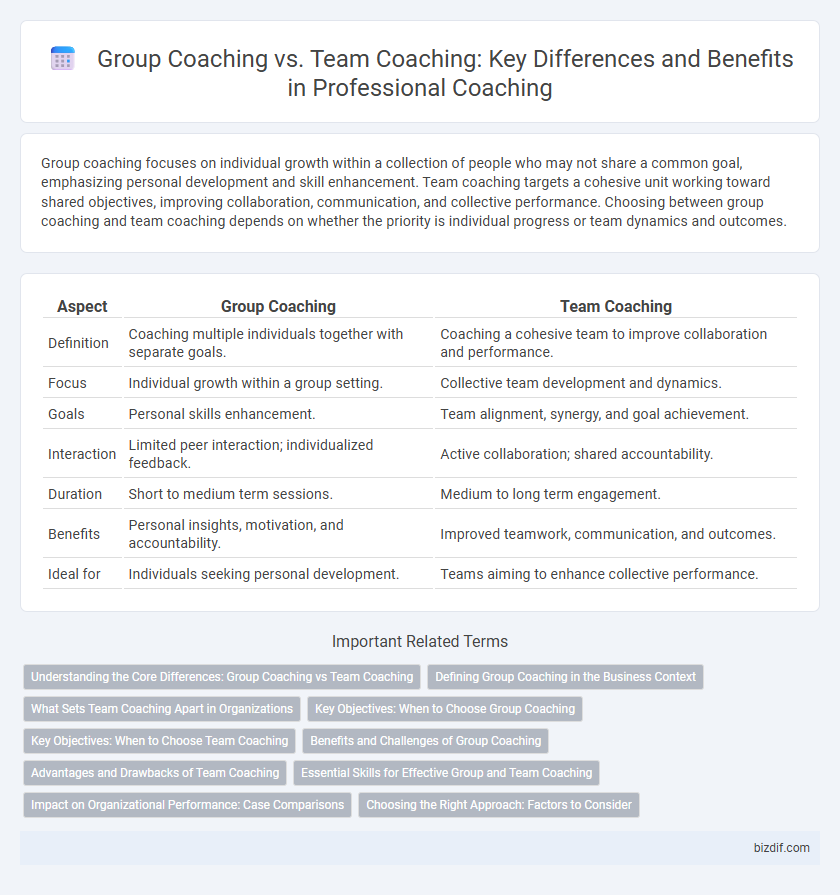Group coaching focuses on individual growth within a collection of people who may not share a common goal, emphasizing personal development and skill enhancement. Team coaching targets a cohesive unit working toward shared objectives, improving collaboration, communication, and collective performance. Choosing between group coaching and team coaching depends on whether the priority is individual progress or team dynamics and outcomes.
Table of Comparison
| Aspect | Group Coaching | Team Coaching |
|---|---|---|
| Definition | Coaching multiple individuals together with separate goals. | Coaching a cohesive team to improve collaboration and performance. |
| Focus | Individual growth within a group setting. | Collective team development and dynamics. |
| Goals | Personal skills enhancement. | Team alignment, synergy, and goal achievement. |
| Interaction | Limited peer interaction; individualized feedback. | Active collaboration; shared accountability. |
| Duration | Short to medium term sessions. | Medium to long term engagement. |
| Benefits | Personal insights, motivation, and accountability. | Improved teamwork, communication, and outcomes. |
| Ideal for | Individuals seeking personal development. | Teams aiming to enhance collective performance. |
Understanding the Core Differences: Group Coaching vs Team Coaching
Group coaching involves facilitating individual development within a collection of people who share similar goals but work independently, focusing on personal growth and skill enhancement. Team coaching targets the collective performance of a cohesive unit, emphasizing collaboration, communication, and shared objectives to improve overall team dynamics and effectiveness. Understanding these distinctions is crucial for selecting the appropriate coaching approach that aligns with organizational needs and desired outcomes.
Defining Group Coaching in the Business Context
Group coaching in the business context involves guiding multiple individuals simultaneously to develop skills, enhance performance, and achieve personal or professional goals. It focuses on shared learning experiences while addressing each participant's unique challenges within a collaborative environment. This approach maximizes resource efficiency and fosters peer support, differing from team coaching, which targets collective team dynamics and objectives.
What Sets Team Coaching Apart in Organizations
Team coaching in organizations centers on enhancing collective dynamics and achieving shared goals, fostering synergy among members with interdependent roles. Unlike group coaching, which often addresses individual development within a group setting, team coaching targets collaboration, communication, and conflict resolution to improve overall team performance. This approach aligns coaching interventions with organizational objectives, driving systemic change and boosting productivity through collective accountability.
Key Objectives: When to Choose Group Coaching
Group coaching is ideal for individuals seeking personal development within a supportive learning community, emphasizing shared goals and diverse perspectives. It focuses on enhancing individual skills, confidence, and accountability through collective engagement without direct organizational alignment. Choose group coaching when the primary objective is personal growth across varied participants rather than driving a unified team performance.
Key Objectives: When to Choose Team Coaching
Team coaching is ideal when the key objectives include improving collaboration, aligning goals, and enhancing collective performance within an established group working interdependently. Group coaching suits situations where individuals seek personal development or skill-building without necessarily sharing a common project or purpose. Choose team coaching to foster unity, accountability, and shared success in achieving specific organizational outcomes.
Benefits and Challenges of Group Coaching
Group coaching fosters personal development by addressing individual goals within a collective environment, enhancing peer learning and support. It benefits participants through diverse perspectives and increased accountability, yet challenges include managing varied expectations and maintaining engagement across different personalities. Effective facilitators navigate these difficulties by creating inclusive dialogue and aligning session objectives with participants' unique needs.
Advantages and Drawbacks of Team Coaching
Team coaching enhances collaboration by aligning group members toward common goals, improving communication and increasing overall productivity. It may face challenges like managing diverse personalities and potential conflicts, which require skilled facilitation to ensure effective engagement. Despite these drawbacks, team coaching fosters a collective mindset and promotes sustainable performance improvement.
Essential Skills for Effective Group and Team Coaching
Effective group coaching requires strong facilitation skills to manage diverse personalities and foster open communication. Team coaching emphasizes collaboration and conflict resolution techniques to align group dynamics with shared goals. Both approaches rely on active listening, empathy, and strategic questioning to enhance collective performance.
Impact on Organizational Performance: Case Comparisons
Group coaching enhances individual skill development and personal growth within diverse participants, driving improved performance through shared learning experiences. Team coaching targets collective dynamics, fostering collaboration, trust, and alignment towards common organizational goals, resulting in elevated team productivity and cohesion. Case comparisons reveal that organizations leveraging team coaching report higher improvements in project outcomes and employee engagement, whereas group coaching primarily benefits personal accountability and skill acquisition.
Choosing the Right Approach: Factors to Consider
Choosing between group coaching and team coaching depends on factors such as the specific goals, the dynamics among participants, and the desired outcomes. Group coaching suits individuals seeking personal development within a shared learning environment, while team coaching targets improving collective performance and collaboration in an established team. Assessing the level of interaction, accountability needs, and organizational context ensures the selected approach maximizes impact and drives growth.
Group coaching vs team coaching Infographic

 bizdif.com
bizdif.com